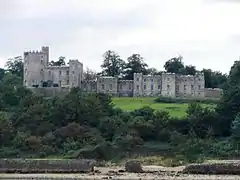Lord Henry Seymour (politician)
Lord Henry Seymour (15 December 1746 – 5 February 1830) was a British politician, the second son of Francis Seymour-Conway, 1st Marquess of Hertford. He was known as Hon. Henry Seymour-Conway until 1793, when his father was created a marquess; he then became Lord Henry Seymour-Conway, but dropped the surname of Conway after his father's death in 1794.

Seymour-Conway was educated at Eton and Hertford College, Oxford, and took his MA from Merton College in 1767. He was first elected to the House of Commons in 1766 as Member for Coventry. He generally, though not always, voted with his uncle and namesake Henry Seymour Conway. After the 1768 election, when he and Andrew Archer defeated a challenge by Walter Waring, he was a consistent supporter of the Grafton and then the North governments.[1]
Due to a falling-out between his father, the Earl of Hertford, and the Corporation of Coventry,[2] Seymour-Conway did not stand as a candidate there at the 1774 election. He was instead returned by the North administration at Midhurst, which was a Treasury borough that year. In 1776, he was also returned to the Parliament of Ireland for Antrim County, which he represented until 1783. As his re-election in Midhurst did not appear to be sustainable in the 1780 election, he stood successfully at Downton. In the 1784 election, Seymour-Conway and Robert Shafto faced off against Hon. Edward Bouverie and William Scott, and, a double return being made, the case came before the House of Commons. Seymour-Conway chose not to stand in the ensuing by-election; his brother William took his place and won the by-election.[1] During this period, he was for some time a captain in the Warwickshire Militia,[3] and befriended the poet George Crabbe while quartered at Aldeburgh.[4] On 11 February 1793, he was promoted major.[5]
The election of 1784 marked Henry's retirement from politics. In 1790, he and his brother Robert were jointly granted, for life, the sinecures of joint prothonotary, clerk of the crown, filazer, and keeper of the declarations of the King's Bench in Ireland. By 1816, these offices brought an income of more than £10,000 a year (equivalent to £771,099 as of 2019) [6]. He was also craner and wharfinger of the Port of Dublin, a sinecure abolished in 1830.
He spent the rest of his life in the improvement of his estate at Norris Castle, in the Isle of Wight, where he experimented with the use of seaweed as a fertiliser. He had a reputation for both eccentricity and benevolence when he died, unmarried, in 1830.[7] There is a memorial to him in St. Mildred's Church, Whippingham. He left Norris Castle to his youngest brother Lord George Seymour, who sold it to newspaperman Robert Bell in 1839.
References
- Brooke, John (1964). "SEYMOUR CONWAY, Hon. Henry (1746-1830).". In Namier, Sir Lewis; Brooke, John (eds.). The House of Commons 1754-1790. The History of Parliament Trust.
- Whitley, T.W. (1894). The Parilamentary representation of the city of Coventry. Coventry: Curtis & Beamish. p. 171. Retrieved 21 November 2009.
- "Militia Musters". Retrieved 21 November 2009.
- Houchon, René Louis; Frederick Clarke (1907). George Crabbe and his times, 1754-1832. London: John Murray. p. 69. Retrieved 21 November 2009.
- "No. 13516". The London Gazette. 2 April 1793. p. 270.
- UK Retail Price Index inflation figures are based on data from Clark, Gregory (2017). "The Annual RPI and Average Earnings for Britain, 1209 to Present (New Series)". MeasuringWorth. Retrieved 2 February 2020.
- "Obituary". Gentleman's Magazine: 363. April 1830. Retrieved 21 November 2009.
| Parliament of Ireland | ||
|---|---|---|
| Preceded by Viscount Dunluce Viscount Beauchamp |
Member of Parliament for Antrim County 1776–1783 With: James Willson |
Succeeded by James O'Neill Hon. Hercules Rowley |
| Parliament of Great Britain | ||
| Preceded by James Hewitt Hon. Andrew Archer |
Member of Parliament for Coventry 1766–1774 With: Hon. Andrew Archer 1766–1768 Sir Richard Glyn 1768–1773 Walter Waring 1773–1774 |
Succeeded by Walter Waring Edward Roe Yeo |
| Preceded by Herbert Mackworth Clement Tudway |
Member of Parliament for Midhurst 1774–1780 With: John Ord |
Succeeded by Hon. John St John Hon. Henry Drummond |
| Preceded by Sir Philip Hales Robert Shafto |
Member of Parliament for Downton 1780–1784 With: Robert Shafto |
Succeeded by Robert Shafto Hon. William Seymour-Conway |